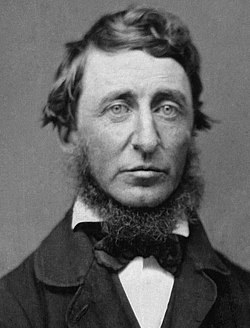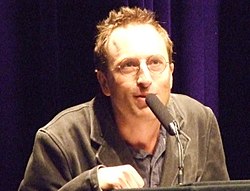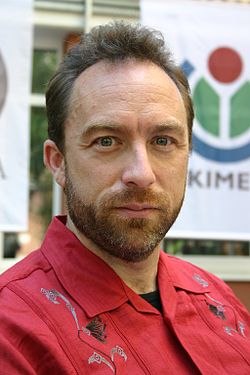Saving Wikipedia; Internet regulation; Thoreau quote hoax
"Saving Wikipedia"

Time profiles (April 14) Lila Tretikov, executive director of the Wikimedia Foundation. Time paints a grim picture of the challenges faced by Tretikov and the encyclopedia, many of which were discussed in a recent Signpost's special report: a "meager annual budget", the gender gap, "critical gaps in coverage" (such as the Global South), the shrinking ranks of active editors, and the lack of contributions from those who access Wikipedia content through mobile devices, search engines, and personal digital assistants. Time speculates that Wikipedia could contract suddenly, with something similar to the almost 25% dropoff in active editors on the Italian Wikipedia in 2013, or dwindle gradually, a possibility that Andrew Lih (Fuzheado) compared to "the boiling frogs scenario". William Beutler (WWB), author of the blog The Wikipedian, told Time "I do not envy Lila Tretikov’s position."
Time outlined efforts by Tretikov and the WMF to address these issues, such as the Inspire Campaign and Wikipedia Zero. Time wrote that "Tretikov is focusing the Foundation’s limited resources on how readers and editors use the site," including gathering data about user preferences, increasing the number of WMF engineers, and improving and creating editing software like mobile apps.
Time notes that some of these efforts have brought the WMF into conflict with the editing community, especially the controversy involving Media Viewer (see previous Signpost coverage). Time highlighted a comment on the German Wikipedia from the controversy: “I want victory over the WMF. I want the WMF to shudder when they remember this case.”
Tretikov said to Time that “It’s not realistic to have everybody always in the boat with you,” which may sound ominous to those who wish the WMF to be more responsive to active editors, who Time writes "seem to have divergent views about almost everything." Beutler summed up his view of the problem for Time:
| “ | The Wikipedia community is full of old timers who are used to getting their way and don’t like things changing, and I think it’s important that the community always be forced to rethink, is Wikipedia everything that it can be right now? | ” |
Wikipedians offer libertarian perspectives on Internet regulation
In The Huffington Post UK, Jimmy Wales writes "To Protect the Most Fundamental Rights of Internet Users, We Must Always Be Skeptical of Any Call for Regulation" (April 13). Wales credited "The 'anarchical' character of the Internet" for allowing people to contribute and share knowledge and placed Wikipedia in this tradition. Wikipedia "is based on this simple, yet revolutionary, concept of allowing free and unlimited access to the sum of all human knowledge."
Wales echos libertarian thought when warning of the harmful effect of "even seemingly minor regulation," citing regulations that allow Internet censorship in China and the global surveillance disclosures of Edward Snowden. He writes "even milder regulations by progressive democratic governments must be observed skeptically."
Wales concludes:
| “ | In order to protect the most fundamental rights of Internet users, we must always be skeptical of any call for regulation. Current regulation must also be carefully and durably observed for any unnoticed expansion of its implementation. The Big Brother will always want to collect more information about us in order to gain power and control. We should not make it easy on him. | ” |
In the libertarian magazine Reason, where he is a contributing editor, Mike Godwin writes "What the 'Zero Rating' Debate Reveals About Net Neutrality (April 8). Godwin is former general counsel for the Wikimedia Foundation and is general counsel and director of innovation policy at The R Street Institute, a libertarian think tank.
Godwin opposes "net-neutrality absolutists" who are concerned that "zero-rated services", such as Wikipedia Zero, which are free of mobile usage charges, have troubling implications for net neutrality. He argues that "In the long run, increased demand and increased capacity, together with the free informational resources that Wikipedia and its sibling projects provide, will promote increased Internet access in the developing world."
Fake Thoreau quote uncovered on Wikipedia

At Medium's The Message, librarian Jessamyn West tracks the history (April 13) of a fake quotation about American author Henry David Thoreau, attributed to another famous American author, Louisa May Alcott. The original edit, from December 2007, read:
| “ | Thoreau also wore a neck-beard for many years, which he insisted many women found attractive. However, Louisa May Alcott reportedly mentioned to Emerson that Thoreau's facial hair "will most assuredly deflect amorous advances and preserve the man's virtue in perpetuity." Thoreau did in fact die a virgin. | ” |
Within hours, the edit was removed by an editor asking for a reference. The same day, a reference was duly supplied, to the entirety of the sixteen volume collection The Journals and Miscellaneous Notebooks of Ralph Waldo Emerson. Another editor removed the final sentence about Thoreau's virginity, thanked the hoaxer for the reference, and asked for "a proper volume/page reference". The hoaxer did not respond and no further action was taken. When the hoaxer attempted to remove their own hoax in April 2008, they were reverted by another editor, who wrote "the information is referenced; if you say it's wrong, prove it." Protected by the faux reference, the hoax remained in the article until it was removed by Mr. Granger in March 2014. During the six years it was on Wikipedia, the fake quote made its way into articles, blogs, speeches, and even quizbowl questions.
West attempted to decisively "prove it" a hoax. Unsatisfied with simply not locating the quotation in Emerson's journals in Google Books, she contacted John Overholt, Curator of Early Modern Books & Manuscripts at Harvard University's Houghton Library. (Overholt also created the Tumblr blog First Drafts of History, featuring first edits of Wikipedia articles.) Overholt told West
| “ | There are five “perpetuity”s in the 15 volumes, and definitely none of them are that quote. There are no instances in which “Thoreau” and “beard” appear together, nor any variation of neckbeard. There are only a handful of references to Louisa May Alcott in the set, and none of them are that anecdote. So I think you can consider it conclusively debunked. | ” |
West concluded "I hope we’ve all learned something about the nature of online citation and that if you really need to know something for certain, ask a librarian."
Wikipedia and online reputation management

British journalist Jon Ronson's March 2015 book So You've Been Publicly Shamed contains a discussion of the online reputation management services provided to one public shaming victim, Lindsey Stone, by Reputation.com. Stone had no Wikipedia presence, but Ronson discussed the work of the company Metal Rabbit with Graeme Wood, who alleged that the Wikipedia article of an unnamed United Nations peacekeeper was edited by the company. Wood wrote a 2013 article on online reputation management for New York which discusses a Metal Rabbit client called "Chad" (not his real name), who is likely the UN peacekeeper. A 2011 profile in the New York Times of Metal Rabbit and its founder, Bryce Tom, noted that "'On a recent Wednesday afternoon, [Tom] was preparing a briefing for a new client, describing how he would 'fix' Wikipedia and the top search results on various search engines. On the walls of his office were framed copies of Google search results and Wikipedia entries of clients: a reality television star, a movie actress and a chief executive officer. Mr. Tom calls it his “wall of fame.'"
In brief
- In The Daily Telegraph, University Challenge winner Ted Loveday credits Wikipedia (April 15) with his success.
- Alabama Media Group columnist John Archibald suggests (April 12) that UA alum Jimmy Wales serve on the Board of Trustees of the University of Alabama.
- At swissinfo.ch, on the occasion of the Historical Dictionary of Switzerland reaching the final letter of the alphabet, Professor François Valloton of the University of Lausanne ponders the future (April 11) of such reference works in the age of Wikipedia.
- At University Affairs, Professor Christian Vandendorpe, honorary Wikipedian in residence at the University of Victoria, calls Wikipedia "A gift to the world" (April 8) and writes that "Scholars need to embrace it and do all they can to support it."




Discuss this story
Thoreau, Emerson & Alcott
There has been all sorts of speculation about Alcott and Thoreau, and the hoax probably came from someone trying to prove that Alcott said "As for taking Thoreau's arm, I should as soon take the arm of an elm tree.", a quote often attributed to Alcott, but actually from the pen of Emerson here. Jane (talk) 15:57, 17 April 2015 (UTC)[reply]
No mention of Caitlin Dewey's story
Space for Time's April 14 story. Space for Ted Loveday's April 15 mention. No space for Caitlin Dewey's story from April 15, which went to the front page of Slashdot? Is there some rationale; perhaps that Dewey's story and the vandalism experiment it discussed will be given a more complete treatment in the next Signpost ITM? - 2001:558:1400:10:CC0F:8EAD:7C36:144A (talk) 16:02, 17 April 2015 (UTC)[reply]
Saving Wikipedia?
I am having trouble reconciling the claims of a "meager annual budget" with the discussion at Wikipedia:Wikipedia Signpost/2015-03-18/Op-ed#Computer equipment and office furniture and my subsequent failure to get anyone at WMF to show me an accounting of what computer equipment and office furniture was bought and the price paid. --Guy Macon (talk) 18:10, 17 April 2015 (UTC)[reply]
While it may be easy and convenient to point to inflexible "old timers" for the current problem, anyone who has an attention span larger than that of a gnat knows the real problem is that the WMF has a record of proposing 1) bad ideas, and that Wikipedia's model for change is flawed as it depends on 2) community consensus, which any major organization knows places you dead in the water when it comes to pushing new ideas at a large scale. So blaming old timers for this problem might be a nice soundbite and a great excuse, but it ignores the actual problem. Bad ideas are dead on arrival, and consensus isn't the right process for change at the scale of Wikipedia. I would like to see the Signpost address these facts. Right now on Jimbo's talk page, there's a rough but energetic consensus that the community needs tools to help insure the accuracy of content. Will we see the WMF create these tools? Viriditas (talk) 23:56, 18 April 2015 (UTC)[reply]
Article in Time Magazine
I was really happy to see the non-profit aspect as the first factoid in the first sentence of an article about Wikipedia, and this is in Time magazine - yay! I also love how they qualified the line about "288 languages" with 2 key figures: 4.9 million articles on enwiki, and 36 million articles total. Anyone who does the math will quickly realize there are not many articles in the long tail of that "288" number. Though geographic diversity issues are equated with the Gendergap, I was also happy to see both highlighted. I count 62 edits a second on enwiki alone this morning in "Recent changes", so I think the "10 edits a second" for all projects is off by a factor of 100 at least. No mention of the "Copyright gap" which is just as much a threat to Wikipedia as the drop-off in editors. Like others, I was very sad to be called one of the "old timers who are used to getting their way" by Beutler and it should be noted that the WMF did not say this. We old timers never got our way after repeated requests and it's time to listen and react to some of these (very old) requests, or we will continue to drop off, confusing the WMF in their monthly reports. Though I agree with Lila that “It’s not realistic to have everybody always in the boat with you,” I do believe it is crucial that everybody can see where the boat is going so that they can feel that the boat is going somewhere they want to go too. Jane (talk) 07:05, 19 April 2015 (UTC)[reply]
Murder most foul
I daresay I hear the Jaws theme playing right about now.
Depending upon how things are handled, we could see a mass exodus of Wikipedia newbies and oldbies alike who like the "Wikipedia format" of doing things over the way many other places do, or we could see actual improvement that benefits everyone.
We should never throw our long-standing shipmates overboard because we don't wish to bother considering compromise. The "old timers" referred to by William Beutler are no less important that any of the "new timers". This idea that "old is bad" needs to be discarded, as it is utter hogwash.
Radicalism will get you nowhere fast, by the way. Tharthandorf Aquanashi (talk) 15:15, 18 April 2015 (UTC)[reply]
Always 1984...
But what of Brave New World, the liberal equivalent of 1984? No one seems to bat an eye at the events of that book taking place, even though they are far more likely in this day and age. Tharthandorf Aquanashi (talk) 15:31, 18 April 2015 (UTC)[reply]
Freedom RockFox News, man? Turn it up!" Viriditas (talk) 19:41, 18 April 2015 (UTC)[reply]Libertarian perspective
While this piece plays to the choir, so to speak, it is unfortunately incredibly biased and promotes discredited, minority opinions without presenting other, more mainstream POV. The fact remains, there is no country or society on the planet where libertarianism has ever succeeded in practice. It remains a theoretical construct that has failed in every respect when it is implemented. Regulations may not be ideal, but they have a rationale and a purpose that benefits most people and institutions. Promoting the extreme minority viewpoints of people who think the governments of Somalia and Honduras are libertarian paradises is naive. While I despise statism and bureaucracy as much as the next person, and wish that limited and self-government were ideals to work towards, I am not stupid enough to believe in the libertarian fantasy that removing all regulations is the answer. This article fails in every respect to present more established views. Viriditas (talk) 19:57, 18 April 2015 (UTC)[reply]
@Gamaliel: Is the Signpost designed to be an uncritical, milquetoast, softball-throwing lapdog for the Wikipedia establishment that never asks questions or challenges assumptions? If it is, and you guys are busy drinking the Konservative Kool-Aid of the Job Kreators, then please excuse my confusion and carry on. In that case, I'll expect to be more disinformed in the next issue. If, on the other hand, this is a legitimate news organization, that deals with facts not fantasies, I would expect you to challenge and question false statements and myths, such as the idea that the Internet was an "anarchy" free from government intervention. In fact, the Internet has always been highly organized and regulated, and is a direct product of public funding. It was actually conservatives like Jim Sensenbrenner who introduced the Patriot Act and it was conservative libertarians like Rand Paul who helped defeat NSA reform (and he actually admitted it). These so-called libertarians say we must be skeptical of any call for regulation, yet do absolutely nothing when individual freedoms are threatened. After all this time, organizations like Reason and R Street Institute can't point to a single, solitary success in the fight for individual freedoms, and refuse to support the people who are actually doing the hard work to preserve our freedoms. Libertarianism is a failed philosophy that exists as a fantastical talking point, snake oil for the 1% to steal from the public trough. The technological utopia that libertarians wax poetic about has always been a myth, and its crazy uncle transhumanism has always been its religious underpinning. All this talk about greater individual freedom and access is bullshit. The facts show otherwise. We see less freedom across the board, and less access, with inequality growing in every sector. As automation increases, 80% of the workplace is projected to be unemployed in the next two decades. What does libertarianism say about this? Absolutely nothing. It's time to stop giving these people space to promote their fantasies and to start asking the hard questions. Viriditas (talk) 00:27, 19 April 2015 (UTC)[reply]
Conflict management and talent scouting
What Wikipedia needs is, among others, better conflict management and a talent scout programme offering guidance and protection for productive new editors.
— Hyphantes